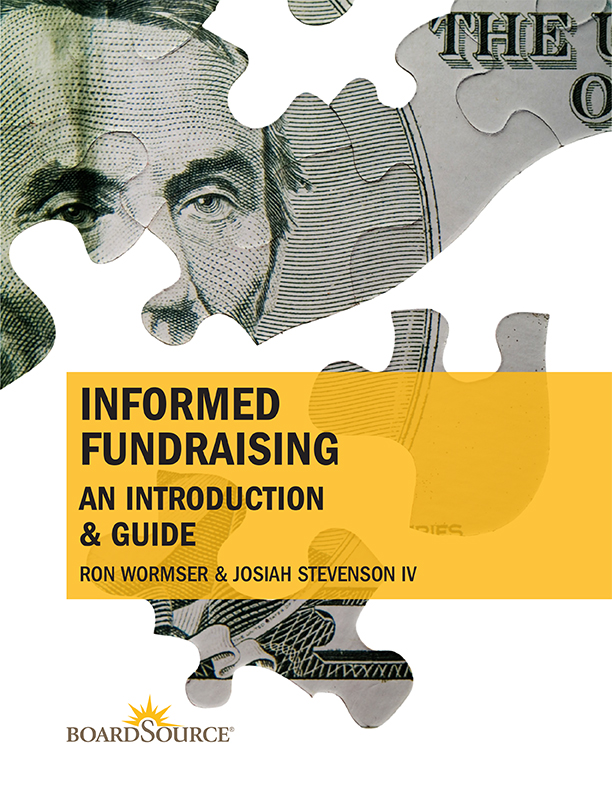Enabling Board Members and Executive Directors to Increase the Effectiveness of Their Nonprofits
Effective nonprofits and those who lead them — board members and executive directors — require a clear understanding of nonprofit governance and managerial functions, which is a prerequisite for the preparation of informed plans and strategies, followed by capable and consistent execution.
 After almost 50 years with nonprofits as an executive — and subsequently as a board member, executive coach, consultant and volunteer — it is time to share the lessons I’ve learned about how to govern and manage nonprofits for optimum effectiveness. Three types of resources are available:
After almost 50 years with nonprofits as an executive — and subsequently as a board member, executive coach, consultant and volunteer — it is time to share the lessons I’ve learned about how to govern and manage nonprofits for optimum effectiveness. Three types of resources are available:
Guides to Governance and Management Functions
The first guide, Informed Fundraising, answers the question, “What do I as a board member or executive director need to know about fundraising in order to help my nonprofit raise more money?” Future guides will cover other nonprofit functions, including governance and mission-focused strategic program and financial planning.
Learn MoreToolkits for Improving Functional Tasks
Boards and executive directors perform and share many functions. For each function, different tasks are required — for example, donor recognition is one task of fundraising. Toolkits include samples of how to implement different tasks and are accompanied by explanatory text.
Learn MoreAvailable Assistance for Nonprofits
For those who would like my assistance with Informed Fundraising, toolkit materials, and governing or managing their nonprofits, three types of assistance — customized to the needs of each client — are available.
Learn MorePhoto Courtesy of Robert Walch, The Salinas Californian
6 Prerequisites for Effective Nonprofits
- 1 An Informed and Engaged Board
- 2 Board and Executive Director Teamwork
- 3 Informed Fundraising
- 4 Mission-Driven Strategic Planning
- 5 Necessary Staffing and Other Resources
- 6 Consistent Monitoring of Results Fulfilling the Mission
About Ron Wormser
Ron grew up in West Virginia, where both of his parents regularly volunteered in community service organizations: his father primarily at a Veteran’s Hospital and his mother at the county hospital—influences which have shaped Ron’s life ever since.
Having also experienced the transformative effect of higher education as an undergraduate, and subsequently in graduate school, Ron began his career working at the Harvard Graduate School of Education in general administration and student financial aid. Within a few years, he had assumed executive roles as Associate Dean for finance, administration and fundraising.
He continued in a similar position with the State University of New York’s College at New Paltz, while also staffing the College Council, an advisory board appointed by the State Governor.
After being on a college campus continuously from 1961 to 1976, Ron wanted to further his work in higher education from a different perspective, and became Vice President of the Institute of International Education, headquartered in New York City with branch offices in the US and abroad.
At various times during his years with IIE, Ron was responsible for finance and administration, fundraising, and regional and overseas services. The latter involved administrative support services for a network of international agricultural research centers based mostly in developing countries. Throughout his 13 years, he was the primary liaison with and support for the Institute’s Board of Trustees and its committees.
Meanwhile an enjoyment of and interest in the performing arts led Ron to seek an opportunity to combine his educational and arts interests, and in 1989 became Vice President of The Curtis Institute of Music in Philadelphia. Curtis is a small conservatory with an international student body whose mission is to “educate and train exceptionally gifted young musicians for careers as performing artists at the highest professional level”. It confers both bachelor’s and masters’ degrees. His responsibilities included finance, administration, fundraising and board support for both the Institute and its associated Foundation.
Throughout his career, Ron was actively involved in the accreditation process of colleges and universities, both from an institution’s perspective and as a volunteer with different regional accreditation agencies serving on visiting teams to other institutions.
Ron and his wife Marian retired in 2007 and relocated to the Monterey Peninsula in California. Since retiring, he has continued his accreditation work and has been volunteering his time and sharing his expertise as a consultant, executive coach and board member mostly with community-based human services organizations on the Peninsula and in the Central Valley in and around Salinas, CA. He works both independently and in programs provided by the Community Foundation of Monterey County, Leadership of Monterey Peninsula and the Peninsula Chapter of the Stanford Graduate Business School’s Alumni Consulting Team.
View Ron’s Experience
Connect With Ron
Informed Fundraising: An Introduction and Guide
An eBook for board members and executive directors of nonprofits and others wanting to learn about this critical function
Fundraising efforts that are well-conceived, well-planned, and well-executed maximize the opportunity for reaching fundraising goals, which is why we call it “informed fundraising.”
The purpose of Informed Fundraising – An Introduction and Guide is to educate board members and executive directors how to think about fundraising so they can make informed strategic fundraising decisions which increases the potential to raise the funds needed for their nonprofit.
Too many nonprofits are not successful in raising the money they want or need; smaller, community-based nonprofits are particularly challenged.
Why? Many nonprofits engage in reactive and unproductive efforts to raise money.
Reactive fundraising is the convergence of a nonprofit’s imperative to start or expand fundraising without its decision-makers having the requisite understanding of what fundraising is and what it takes to do it effectively.
In reactive fundraising, whatever ideas are put forward generally are approved and carried out as well as possible — yet almost always yield disappointing results.
In contrast, proactive fundraising — or what we call ‘informed fundraising’ — is when decision-makers acquire an understanding of the concepts of fundraising, including the components of fundraising strategies and plans and how to initiate and assess the plan’s execution.
Informed Fundraising includes text describing basic fundraising concepts, along with sample tools illustrating how to put the concepts to work. These tools are intended to not only illustrate the concepts but to be modified to meet each nonprofit’s particular needs and circumstances.
CHAPTER 2 – TWO TYPES OF FUNDRAISING
There are two distinct types of fundraising: one with a short-term focus on raising immediate cash, and one with a long-term focus on building relationships with ongoing supporters of the organization.
Understanding the distinction between short-term and long-term fundraising is important because
- each has its own style, methodology, results, and costs
- each nonprofit should decide which of the two will best meet its particular needs and circumstances.
The choice will have a significant impact on not only funds raised but also on how your nonprofit is perceived by its various stakeholders. The chosen type says much about the relationship your organization wants with its supporters.
How do the two differ?
Toolkit
Tools for more effective nonprofit governance and management
Currently available task tools are shown below. New tools are continuously being added.
Mission-Driven Strategic Planning
The focus of MDSP is how best to fulfill the nonprofit’s mission under present and likely future circumstances. Mission Goals are complemented by strategies and program and financial plans to achieve the Plan’s objectives. While aspirational, at the conclusion of the process, there is a Plan, a road map that can and is intended to be used in a nonprofit’s ongoing work.
Unique Nonprofit Characteristics
UNC provides the lens through which to see how nonprofits differ from private sector enterprises. A clear perception of the unique characteristics of nonprofits and an understanding of their implications are prerequisites for informed and effective governance and management. A private sector lens produces a distorted view which typically results in misinformed expectations that rarely serve the nonprofit, its staff and mission well.
For more information about these Toolkits and other materials on different aspects of nonprofit governance and management, please contact Ron at [email protected].
Assistance
Workshops and consultation for groups and individuals
For those interested in assistance with their nonprofits, there are three options:
1 Workshops
2 Consultant Services
3 Ad Hoc Assistance
The content of each workshop and consultation will be developed in concert with each client to ensure that the interests and needs of each are addressed.
For more information or to discuss how best to meet your needs, please contact Ron at [email protected].
Workshops
Workshops are one-time events for a group of staff and/or board members from a single nonprofit or for participants from multiple organizations. The goal is to develop a clear understanding of effective fundraising, nonprofit governance and/or management
Consultant Services
Consultant services can be provided to guide an organization in how it can more effectively fundraise or understand and address nonprofit governance and/or management.
Pricing of Workshops / Consultancies
The fees for workshops and consultancies have been established based on two objectives: to be affordable and thus accessible rather than a barrier to access, and to be progressive so that the relative cost to each nonprofit, regardless of size, is roughly the same.
Fees are based on the average annual operating expenses for the three most recent fiscal years. For example, the hourly rate for an average annual expense of $75,000 would be $35, for an average annual expense of $150,000 the rate would be $75, and for an average annual expense of $300,000, $120.
Three-hour sessions are priced at 2.5 x the hourly rate.
Ad Hoc Assistance
For those who would like to be able to ask for assistance from time to time with specific questions, there are two options:
- A package of 3 questions to be used within 6 months, the retainer for which is $150. Questions can be raised at any time. They should be submitted in email; and depending on the nature and complexity of the topic will be answered either in email or on the telephone (at a mutually convenient date and time).
- A package for the number of questions or amount of time you may wish to reserve. Each package will be mutually agreed upon as will the amount of the retainer.
Retainers will need to be paid by check in advance and are non-refundable except in extraordinary circumstances.
Articles
More information on building effective nonprofits
Contact Ron
Publicist
For publicity and speaking engagements, please contact:
Marci Bracco Cain
Chatterbox
(831) 747-7455
[email protected]
Ron’s Mailing List
If you wish to be notified of additions and/or changes to materials and commentary available from Ron, please send a request to be added to Ron’s mailing list.
Join Ron's Mailing ListSend Ron a Message
To get in touch with Ron about all other inquiries, please use the contact form below, or email [email protected].

